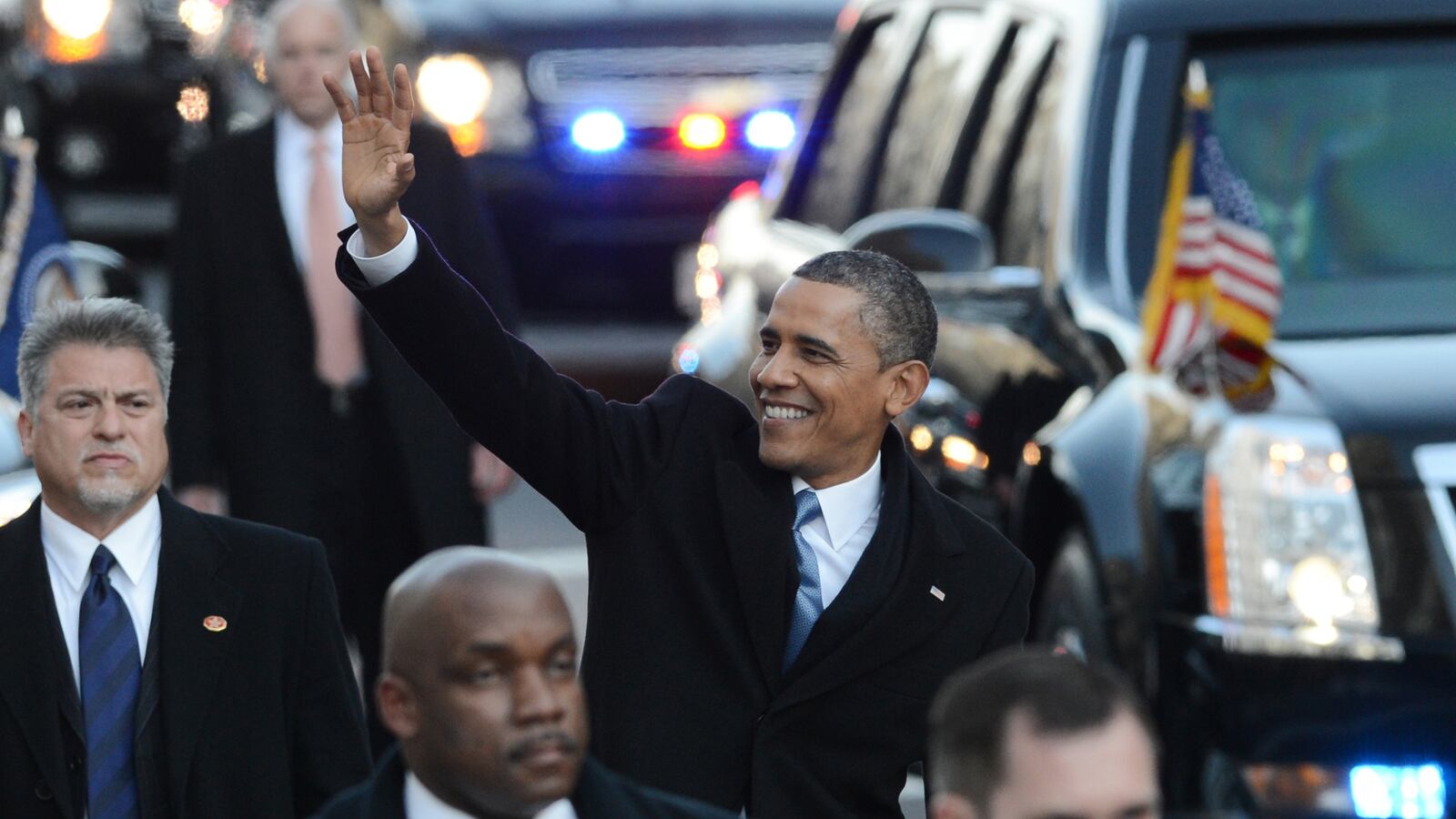Barack Obama’s speech was elegantly pugnacious, a fine articulation of civic-republican liberalism and a very clear statement of a political agenda, with its specific mentions of climate change and inequality and other concerns. As others have noted, it was his most openly liberal speech as president, and it tells us what he aiming for in term two. He wants to do for liberalism (without using the word of course; we’re still not at that point yet) what Ronald Reagan did for conservatism. And he can—but only if he understands and acts on the differences between his situation and Reagan’s, and not their similarities.
It’s only natural for someone who wants to emulate and surpass a predecessor to think about the historical resonances. So Obama might be thinking things like, “He had charisma, I have charisma; he brought the country out of recession, so did I; he put together a new electoral coalition, and so have I.”
These things are true but they’re superficial. What’s important are the differences, and here are two important ones.
First, by Reagan’s time, lots of middle-of-the-road Americans were pretty sick of liberalism. Liberalism had governed the country for decades. Conservatism did not, and so people aren’t sick of conservatism in the same way. People think conservatism is loony. But they haven’t come to resent conservatism in the way that many average Americans of 1980 resented really high tax rates (yes, even I think they were high), inaction in the face of ever-rising crime, and so on.
This difference has implications that Obama needs to recognize. Reagan was tapping into a deep and unexpressed desire of millions of people to smite big government or at least box it about the ears. Obama, alas, can’t rely on any equivalent unexpressed yearning. Millions of people are not, unfortunately, desperate for America to act on climate change. Reagan’s appeal to his coalition was emotional, and it played upon their anger. Obama’s appeal is intellectual, and it has to count on their reason.
This places—unfairly, but that’s the way it is—a much bigger burden on Obama than Reagan ever faced. He has to persuade middle Americans that they have a stake, say, in a carbon tax. That requires a lot of public education, led by the president but fed by a movement of other politicians and grassroots organizations and nonprofit groups and others. It’s enormously hard to get all those stars aligned.
Second, Reagan’s coalition understood itself to exist not just for the sake of Reagan the man, but in order to change the country in fundamental ways. Obama’s coalition, I must say, doesn’t understand that yet.
His voters turned out in big numbers in 2008 and 2012 but stayed home in 2010, to disastrous consequences. They’re going to have to vote in 2014, when Obama is not on the ballot, in 2008-like numbers. They’re going to have to grasp the stakes. They’re enormous. If the Republicans hold the House after 2014, Obama will probably do very little in his last two years. But if the Obama coalition comes to the polls and puts the Democrats back in charge of the House and keeps them in charge of the Senate, then the last two years can be as active as the first two.

This requires leadership from the party and voting organizations first and foremost. It also requires that liberals think differently about politics and not interpret every Obama shortcoming as some kind of sellout. When Reagan raised taxes, generally speaking, the right wingers didn’t curse him that much. They cursed the evil Democrats who made him raise taxes. That keeps the rank and file’s rage focused on the right target. Democrats and liberals today could learn from this.
It’s harder to do liberalism than to do conservatism. A lot harder. Conservatism is leave me alone. Liberalism is no, here’s why we’re better together. I don’t deny Reagan’s political skills, which were considerable, but he had it comparatively easy. “I wanna cut your taxes in half” isn’t exactly a hard sell to most people.
Obama set some very high goals for himself in this speech. He wants to end once and for all the era of what I call default conservatism, so that average Americans, people in the middle who aren’t strongly committed one way or the other, think “better together” as their first instinct instead of “leave me alone.” I think he can do it, especially with the unwitting help of the Republicans, who get dumber every week. But he needs to be clear that to be our Reagan, he’ll have to work two or three times as hard.






